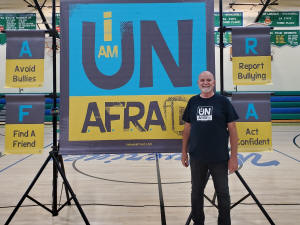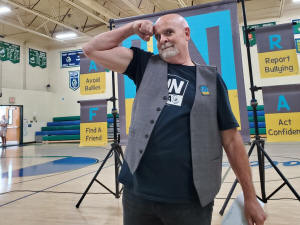|

A comedian, musician, and storyteller, with a Ph.D. in Education,
Dr. Jay uses age-appropriate comedy, stories and engaging
instruction to present his anti-bullying messages to schools. Dr.
Jay is from Greenville, North Carolina and has presented his
programs in 45 states over the last 40 years.
Dr. Jay says bullying begins in elementary school and peaks in
middle school.
Research has shown Dr. Jay says that 75 percent of students who
committed deadly crimes were harassed or bullied. He said that is
not an excuse for what they do, but an indication of what we need to
pay attention to. Revenge for bullying is a number one motivator.
The recent school shooter in Texas was bullied and showed some of
the red flags.
Though bullying has always been around, it is getting worse.
Statistics of school shootings between 2009 and 2019 show there were
180 school shootings and 356 victims.
A safe classroom is a learning classroom. Without safe classrooms,
it is hard to have good learning. Some schools get comfortable with
things going well. They may even quit locking doors or following
safety protocols.

Dr. Jay said it takes money for equipment [to make schools safer]
and schools do not always have that money. Research shows America
spends less money on anti-bullying programs than the United Kingdom
does.

On Thursday, August 25, Dr. Jay spoke to sixth through eighth grade
students at West Lincoln Broadwell School. Dr. Jay said to the
teachers, “If they laugh, they listen. If they listen, they learn.”
Students are looking for the next funny thing and during that time,
Dr. Jay is saying stuff that makes a difference.
Dr. Jay said when he told the kids in the morning assembly, we are
going to talk about bullying, you should have seen their faces. In a
funny, high pitched childlike voice, Dr. Jay said “I don’t want to.
I don’t like bullies and I don’t think they like you.”
Bullying is not funny and not fun to talk about, but Dr. Jay said it
would be today. Bullying is a problem. According to research, around
80 to 90 percent of students are bullied during their school years.
Thirty percent are bullied on a weekly basis. He referred to
research all throughout the presentation.
After today, Dr. Jay told students, “you are going to able to deal
with bullies and bullying situations.” In education, we know the
best way to reduce bullying is not to talk to the bullies because
they made the wrong decision. Talking to victims and bystanders is
the best way to reduce bullying. He said, most of you are victims at
some point in life and all of you are bystanders. You are standing
by watching bullying happening.

Next, in a deep voice, Dr. Jay said to all the students, “You have
the power.” Dr. Jay used the acronym AFRA to represent things the
students should do to stop bullies. Each letter stood for something
that would give students power. The student’s new “id” would be “I
am unafraid.”

In doing these things, Dr. Jay said, “You will have power.” He asked
students, “Are you ready for the power?” Students yelled “Yeah!”
People have various definitions of bullying based on their
experiences. Dr. Jay said he has read all the books and all the
research and studies on bullying. However, the best definition for
bullying he has heard came from a kindergartner in Sacramento,
California. The little girl said, “Bullying is when someone tries to
be the boss of you and they’re not the boss of you.”
If someone tries to be the boss of you physically, socially or
emotionally, Dr. Jay said, that is bullying.
As a demonstration, Dr. Jay looked at someone in a funny way. He
said looking at someone in a funny way is not bullying. If you look
at someone in a funny way and the person says stop and you don’t
stop, then it crosses over into bullying. The answer is to empower
victims and bystanders.
[to top of second column] |

The first tip Dr. Jay shared is “Avoid bullies.” It seems so
obvious, but people do not avoid bullies because they want everyone to love
them, not hate them. Schools teach the golden rule of treating others the way
you want to be treated.
There are people who do not like you because you are just there or remind them
of happiness they do not have. Dr. Jay said you should not try to win the
affection of bullies.
When Dr. Jay was growing up, he was bullied by another boy in the back of the
bus. Even when he told the boy to stop, the bully continued to pick on him every
day. Dr. Jay’s friends laughed, and he cried.
One day, Dr. Jay said he learned the power. That day he had to sit in the front
of the bus because there were no seats in the back. Nothing happened to him
because the bully was in the back of the bus.
If you don’t sit near the bully, play with the bully or eat with
the bully, the bully may get the idea he or she needs to change. Dr. Jay said it
works 75 percent of the time.
The second tip Dr. Jay had was to “Find a friend.” It seems easy, but it’s not.
Teachers are not babysitters whose job is to watch you. Dr. Jay told the
students it is your job to watch the teacher. When you can see your teacher, you
are not only a good learner, but you are safe no matter where you go in the
school.
If you go somewhere where there is no teacher or adult, you should find a
friend. You should not be in a school or a neighborhood or anywhere else by
yourself. It is not safe. When you see a teacher or adult, they can help you.
To reinforce this lesson, Dr. Jay had the students repeat, “I will never ever be
in a school or my neighborhood or anywhere else by myself.”
The third tip Dr. Jay shared was “Report bullying.” He said it is not like the
tattling little kids do about every minor thing.
Statistics show 64 percent of students last year did not report bullying. Dr.
Jay said it is not students’ fault, though. Research shows the reasons students
do not report bullying is students say teachers don’t care.
Teachers do care. Dr. Jay said some teachers have been bullied and know exactly
how it feels. Because teachers know how it feels to be bullied, they can help
students figure out how to solve the problem.
This time, Dr. Jay had the teachers repeat after him: “If you tell me, I can
help you. If you don’t tell me, I can’t help you.”

The students were then asked to repeat “If I tell you, you can help me. If I
don’t tell you, you can’t help me.”
The fourth and final tip was to “Act confident.” Dr. Jay said football players
run out on the field like they do because in the locker room, their coach
repeatedly asks if they have their game faces on. Dr. Jay said go strong or go
home.
According to research Dr. Jay has found, students who act confident are up to
three times less likely to be chosen as a target for bullies. He said you need a
game face. Each of us has our own game face. To demonstrate, he made a silly
face.
Teachers have got the answer. Dr. Jay said if you ask teachers how to get a game
face, they will say if you to avoid bullies they don’t pick on you as much and
you will feel pretty confident about yourself. When you find a friend and they
are with you, they empower you and you feel confident about yourself. When you
report bullying and teachers do something about it, you feel good about
yourself. Dr. Jay said you do not even need to be confident, just act confident.
Acting confident can reduce bullying anywhere from 50 to 80 percent of the time.

As Dr. Jay ended the program, he had students repeat the four tips he had
shared. He then had students repeat, “I am unafraid,” which will show they have
the power.
Each student received a sticker with the message “I am unafraid.” Dr. Jay told
the students to tell their parents what “I am unafraid” means and what they had
learned. He thanked the students for being a great audience.
[Angela Reiners]
 |